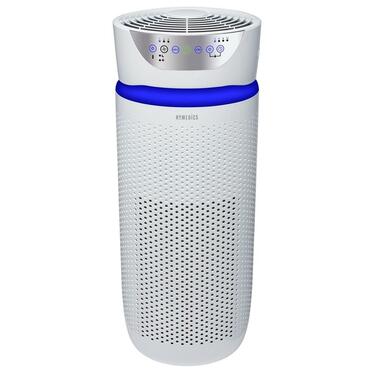Essential oils are fragrant plant derivatives used for aromatherapy. Their smell lingers in the air for a few hours. However, air purifiers remove airborne particles and gases, and may also remove essential oil fragrance from the environment.
Air purifiers with activated charcoal filters, titanium dioxide (TiO2) filters, and/or ozone generators can remove or reduce essential oils dispersed in the air. Other units with HEPA filters or UV light bulbs do not affect volatile compounds and chemicals (essential oils).
Read this article to find out how air purifiers work and why they cannot remove essential oils. The post also includes recommendations for air purifiers and diffuser combination devices that you can consider buying.
Air Purifiers and Removal Of Essential Oils
Air purifiers are devices that sanitize air by trapping more than 99% of airborne pollutants from it. The air is drawn into the unit by a rotating fan. It is then passed through a series of filters, each of which filters different contaminants.
It is essential to note that there are many different types of air purifiers, with different types of filtration systems – which define which particles they can remove efficiently.
Filters That Don’t Remove Essential Oil
Here are the filters that do not affect scent:
Generic Pre-Filters
Pre-filters are generic filters with pores sized 100 to 3000 micrometers. They can only filter large particles, and smaller molecules like essential oils pass through them.
True HEPA Filters
True HEPA filters comprise microscopic pores that can capture particles and pathogens measuring 0.3 microns or more. These can filter bacteria, viruses, molds, pollens, spores, dust, etc.
HEPA filters cannot remove essential oils because they’re even smaller, i.e., <0.3 microns, and pass through the filter pores.
UV Light Bulb
UV light bulbs emit germicidal UV-C light that kills micro-organisms (mainly bacteria) and has no effect on VOCs and chemicals (essential oils).
Ionizers
Ionizers are devices that discharge negative ions to electrically charge the particles and collect them on hard surfaces.
They cannot remove gaseous substances (essential oils) and are only effective against particulate matter.
Filters That Do Remove Essential Oils
Here are the filters that reduce or remove essential oils from the air:
Activated Carbon Filters
Many air purifiers come with activated charcoal. This is carbon treated with oxygen at high temperatures to make it porous.
Gases, VOCs, and chemical compounds, such as essential oils, are adsorbed onto the filter surface and trapped within the pores. Because of this, they are used to reduce strong odors and scents.
Essential oils contain hydrocarbons and oxygenated compounds that are effectively removed by activated charcoal filters.
Note that carbon filters can only reduce oil fragrance to an extent and are not 100% effective because some of the oil molecules pass through them.
TiO2 Filters
TiO2 filters are coated with titanium dioxide, which is a known semi-conductor. They use photocatalysis for filtration. The gas molecules and organic compounds are broken down by oxidation, and thus the smell/fragrance of essential oils is reduced.
Ozone Generators
Ozone is a highly reactive oxygen compound that readily reacts with surrounding molecules to change their molecular structures. By changing the composition of harmful airborne contaminants, ozone gas helps neutralize their harmful effects or pathogenicity.
Essential oils also undergo a similar change in chemical makeup when exposed to ozone; thus, ozone generators or air purifiers that produce ozone can kill their scent.
It is crucial to mention that ozone is also a toxic compound, and beyond 0.1 ppm concentration of the gas can be lethal. Since a whole range of alternative air purifier filters with equal or more effectiveness are available, we recommend avoiding ozone generators.
However, if your unit produces ozone, make sure to keep its levels in check. In the case of ozone generators, it is better to vacate the area to prevent toxic respiratory and skin reactions.
Can Air Purifiers Remove Essential Oils?
Now that we know which filters can trap/inactivate VOCs and chemicals, it is understandable that only air purifiers with one or more of these three filtration systems, i.e., activated carbon filter, TiO2 filter, and ozone generation are effective at removing the scent of essential oils.
Note that the extent to which an air-purifying system removes essential oils depends on the filter quality. This efficiency is determined by MERV (minimum efficiency reporting value) rating. The ideal MERV rating is between 8 and 10. However, every air purifier has its own compatible MERV rating depending on the size of the unit.
Best Air Purifier Diffusers
If you are hoping to enjoy the fragrance of your essential oils while also using an air purifier, your best option is to invest in an air purifier-diffuser combo unit.
Some brands manufacture these combination devices called ‘air purifier diffusers’. Diffusers are the devices that break essential oils down and disperse the small molecules into the air. So, while the air purifier captures dust and allergens from the surrounding air, the diffuser component periodically releases small amounts of fragrant essential oils into the room.
Here are some of the best air purifier diffusers you can consider purchasing:
TotalClean 5-in-1 UV-C Deluxe Air Purifier

The TotalClean 5-in-1 air purifiers by Homedics use a true HEPA filter and UVC technology to remove lead, bacteria, and other air contaminants. The unique feature of this purifier is the essential oil tray pads that provide an easy to use and easy to enjoy aromatherapy experience.
The advanced filtration system works together to create a fresh environment and is ideal for small to medium sized areas of up to 343 sq. ft.
The device features 360o filtration, a night light, a built-in auto-off timer (up to 12 hours), five-speed settings, whisper-quiet sleep mode, and remote control.
Miko HEPA Air Purifier and Essential Oil Diffuser
Miko is a leading brand dealing in home appliances, and their HEPA air purifier and diffuser device are the first on our recommendation list.
It features an H13 HEPA filter that guarantees more than 99.95% elimination of airborne particles measuring 0.2 microns. This ensures effective removal of pollens, pet dander, smoke, bacteria, viruses, germs, molds, fungi, etc.
The device also comprises an essential oil port and amplifier that employ fast vibrations to create ultrasonic waves that dispense oil in the air.
The large coverage (up to 400 sq. ft.), three fan speeds, sleep mode, timer, and easy touch control panel make Miko HEPA air purifier a great choice.
LEVOIT Air Purifier With Fragrance Sponge
The LEVOIT LV-H128 is one of the best combination devices, providing optimal filtration and fragrance.
It has a dual-sided H13 True HEPA filter that captures 99.97% of microscopic airborne pollutants. Other than that, whisper-quiet operation, easy-to-navigate controls, replacement filters, and compact design are some of its amazing features.
Unlike the other two devices discussed in the list, LEVOIT LV-H128 comes with aroma pads. Adding a few drops of essential oil to the pads, the scent will diffuse into the room along with purified air.
Can You Run An Air Purifier and Diffuser At The Same Time?
An air purifier and diffuser can be run simultaneously if the air purification unit doesn’t have VOC removing or inactivating filters, i.e., activated charcoal filter, TiO2 filter, or ozone generator.
HEPA filters, UV bulbs, and ionizers do not affect volatile compounds, and can be run along with diffusers.
Note that carbon filters typically only reduce the fragrance of essential oils not remove them completely, so it is okay to run an air purifier with an activated charcoal filter as long as it doesn’t have a TiO2 filter or ozone generator.
How Do You Remove Essential Oils From The Air?
Essential oils can be removed from the air by using air purifiers with carbon filters, TiO2 filters, or ozone generators.
The fragrance of essential oils usually linger in the air for a few hours (depending on the plants used). You can run an air purifier effectively against VOCs, gases, and chemicals to remove the fragrance. Ensuring proper ventilation and running fans at high speed can also enable faster dissipation.
Since vinegar contains acetic acid (which is helpful in eliminating smells), you can also use it to get rid of essential oils. Simply place an open bowl of vinegar in the room or spray it on the walls and let it sit; the smell will be reduced within minutes.


